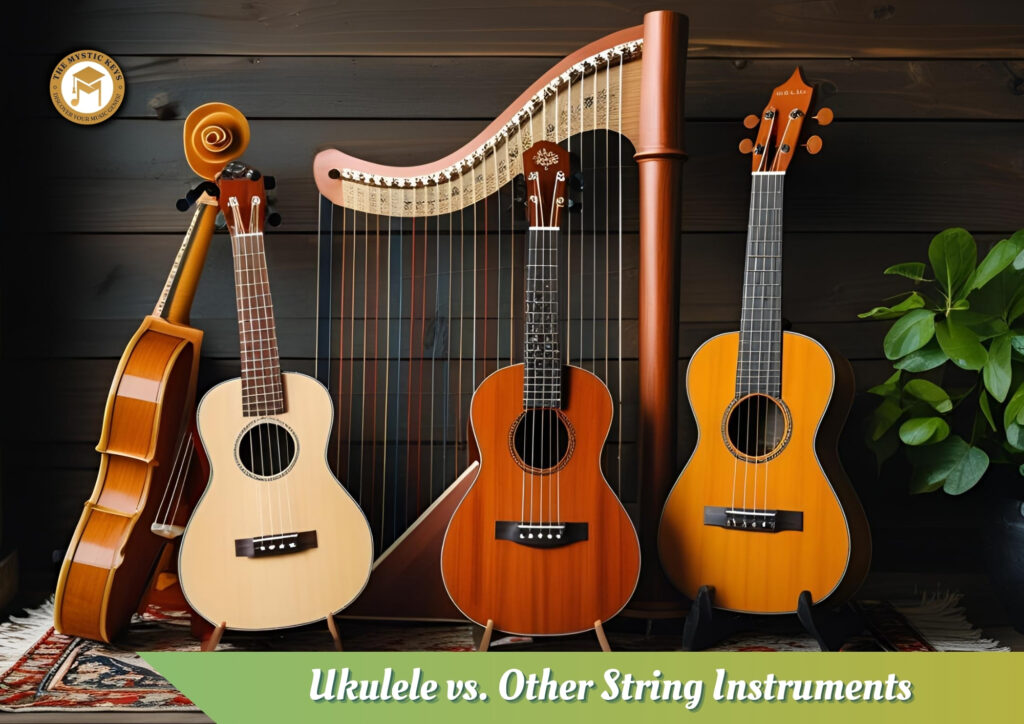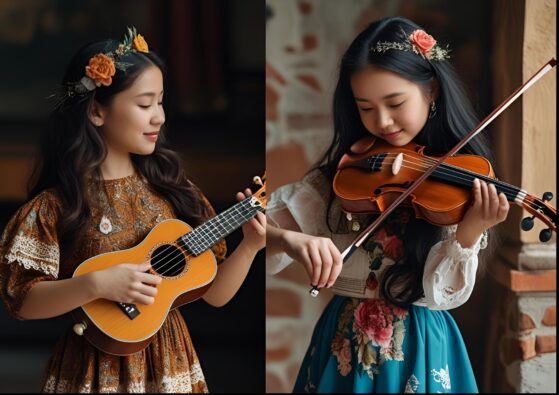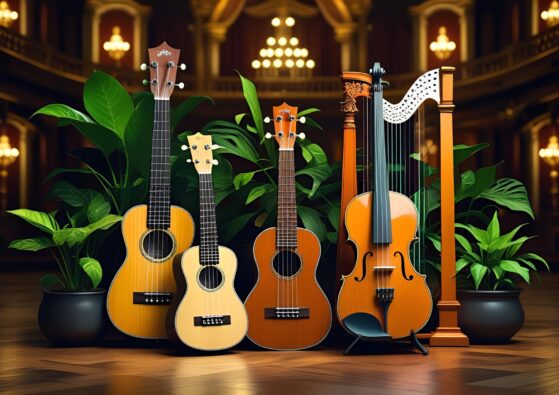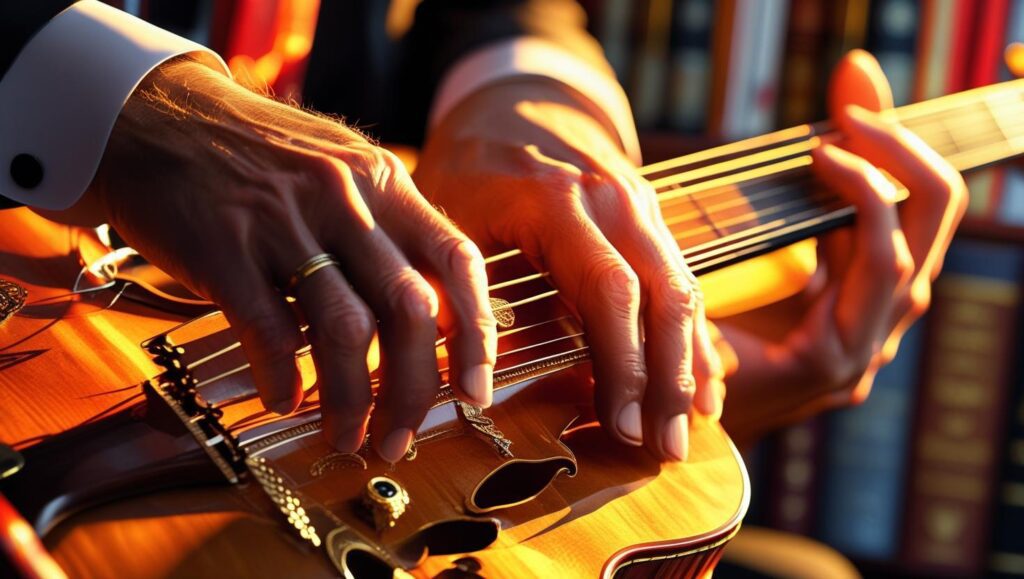
Ukulele vs. Other String Instruments | What makes it unique
Ukulele vs. Other String Instruments | What makes it unique
String instruments form the heartbeat of music across the world. Whether it’s the soaring emotion of a violin, the power of an electric guitar, or the rhythmic sparkle of a banjo, each string instrument carries a unique voice and character. Yet, in the past century, one instrument has emerged as a global favorite for its charm, accessibility, and joyful sound—the ukulele. And when we look at Ukulele vs. Other String Instruments, it becomes clear why this small but mighty instrument holds such a special place in the world of music.
Despite its small size, the ukulele has made a big impact on modern music. To understand what makes it special, it’s worth comparing it to other beloved string instruments. This way, we can see not just how the ukulele differs, but why those differences matter.

Ukulele vs. Other String Instruments – The Origins and Cultural Roots
Before we dive into comparisons, let’s step back in time. The ukulele was born in Hawaii during the late 19th century, when Portuguese immigrants brought small stringed instruments like the machete de braga. Hawaiians quickly embraced the instrument, modifying its structure and tuning to create the ukulele we know today.
By the early 20th century, the ukulele had become a cultural symbol of Hawaii, spreading through America and beyond. Artists like Israel Kamakawiwoʻole and Jake Shimabukuro later carried its legacy forward, proving that the ukulele could be more than just a novelty—it could be a serious and versatile instrument.
This origin story already sets it apart. Unlike the guitar or violin, which have European classical roots, the ukulele carries a distinct island identity—one rooted in community, relaxation, and joy.

Ukulele vs. Other String Instruments | Guitar | The Classic Debate
Size and Playability
The guitar and ukulele look like siblings, but they feel very different. The guitar, with six strings and a larger body, offers a wide tonal range, deep bass notes, and complex chord possibilities. The ukulele, with four strings, is much smaller and lighter, making it easier for children, beginners, or travelers to carry and play.
Sound and Tone
The guitar has a rich, resonant sound with both bright and warm qualities depending on the type (acoustic, classical, or electric). The ukulele’s tone, however, is inherently bright, cheerful, and lighthearted. It doesn’t have the same depth, but its sparkling quality creates a unique atmosphere that the guitar rarely matches.
Learning Experience
Guitars can take weeks to months for a beginner to sound confident. With more strings and complex chord shapes, the learning curve is steeper. In contrast, many ukulele learners can play a handful of songs within a day or two. This simple comparison highlights the core of Ukulele vs. Other String Instruments—its accessibility and beginner-friendly nature make it stand out among its peers.
What Makes the Ukulele Special Here: It democratizes music. Anyone can start making melodies quickly without years of training.

Ukulele vs. Other String Instruments | Violin | Joy vs. Drama
The violin and ukulele are vastly different, yet both captivate audiences in their own ways.
Tone and Emotion
The violin’s voice is unmatched in drama and emotional range—it can sound haunting, passionate, or deeply sorrowful. It thrives in orchestras, chamber music, and solo works. The ukulele, however, almost always projects positivity. Even sad songs played on a ukulele feel softened by its bright timbre.
Technique
The violin requires bow control, finger placement without frets, and years of ear training for intonation. It is considered one of the hardest instruments to learn. The ukulele, with frets and simple strumming, is one of the easiest.
What Makes the Ukulele Special Here: Its accessibility contrasts the violin’s exclusivity. While the violin demands perfection, the ukulele embraces imperfection.

Ukulele vs. Other String Instruments | Banjo | Folk Companions
Shared Brightness
Both the banjo and ukulele produce bright, twangy sounds, but the banjo is louder and more percussive. It often leads in bluegrass and country, where its rhythmic punch defines the genre. The ukulele’s sound is gentler, making it more versatile across genres like jazz, reggae, indie pop, and Hawaiian music.
Strings and Setup
Banjos usually have five strings, including a short drone string, which creates its signature rolling patterns. The ukulele’s four strings keep chords simpler and strumming more straightforward.
Cultural Identity
The banjo carries a distinctly American folk identity, while the ukulele is tied to Hawaiian and island culture. Both are cultural storytellers, but the ukulele’s spread into mainstream pop has given it a wider audience in the 21st century.
What Makes the Ukulele Special Here: Its adaptability across cultures.

Ukulele vs. Other String Instruments | Harp | Simplicity vs. Grandeur
At first glance, the harp and ukulele couldn’t be more different. One is monumental and majestic; the other fits in a backpack.
Complexity
The harp, with dozens of strings, requires a deep understanding of harmony and technique. The ukulele, with just four, is about simplicity and immediacy.
Context
The harp is mostly associated with classical, Celtic, or ceremonial music. The ukulele, by contrast, is flexible—it belongs as much at a beach bonfire as it does on a concert stage.
What Makes the Ukulele Special Here: It brings music to everyday life, not just formal settings.

Ukulele vs. Other String Instruments | Other String Families
Mandolin: The mandolin has eight strings in four pairs, producing a bright, plucky tone used in folk and classical. Compared to the mandolin, the ukulele feels more relaxed and less sharp, with easier chord shapes.
Cello: Deep and sonorous, the cello is a powerhouse of emotion. The ukulele, while opposite in range, offers a complementary brightness. Where the cello moves you to tears, the ukulele makes you smile.
Electric Guitar: With effects and amplification, electric guitars can dominate stadiums. The ukulele can’t match that power, but its acoustic simplicity is exactly its strength.

Ukulele vs. Other String Instruments | Why It Truly Stands Out
When we compare it to other string instruments, certain themes keep reappearing:
Simplicity: With fewer strings, easier chords, and an inviting structure, the ukulele lowers the barrier to entry for music-making.
Portability: You can carry it anywhere—campfires, classrooms, beaches, or concerts. Few instruments are this travel-friendly.
Affordability: Ukuleles are among the most budget-friendly instruments, making them accessible to children, beginners, and hobbyists.
Versatility: Despite its size, the ukulele has been adapted into jazz, reggae, indie pop, and even classical arrangements.
Community Spirit: The ukulele inspires group playing. Ukulele clubs and jam circles have sprung up worldwide because the instrument invites collaboration.
Joyful Identity: Its sound is instantly uplifting. Unlike the dramatic violin or the serious guitar, the ukulele radiates happiness.

Ukulele vs. Other String Instruments | Final Thoughts
The ukulele may not have the depth of the cello, the grandeur of the harp, or the technical firepower of the guitar, but that’s exactly why it’s loved. It reminds us that music isn’t always about perfection, complexity, or showmanship. Sometimes it’s about fun, simplicity, and togetherness.
The ukulele has become more than an instrument—it’s a cultural bridge, a beginner’s first step, and a professional’s refreshing escape. In comparing it with other string instruments, we see that what makes it special is not competition, but its ability to carve its own joyful niche.
At The Mystic Keys, we celebrate this spirit through our Ukulele Lessons Online, helping students of all ages discover the joy of playing. Whether you’re starting fresh or adding a new dimension to your musical journey, the ukulele offers a pathway that is simple yet deeply rewarding.
At the end of the day, the ukulele teaches us a beautiful lesson: that music can be powerful even in its simplest form. Four strings, endless possibilities, and a sound that makes the world smile—this is what makes the ukulele truly special.
For more information and exciting resources about learning music, visit our website at The Mystic Keys. For more music content and exciting offers follow us on
Facebook, Instagram, YouTube, LinkedIn, Twitter, Pinterest, and Threads,














